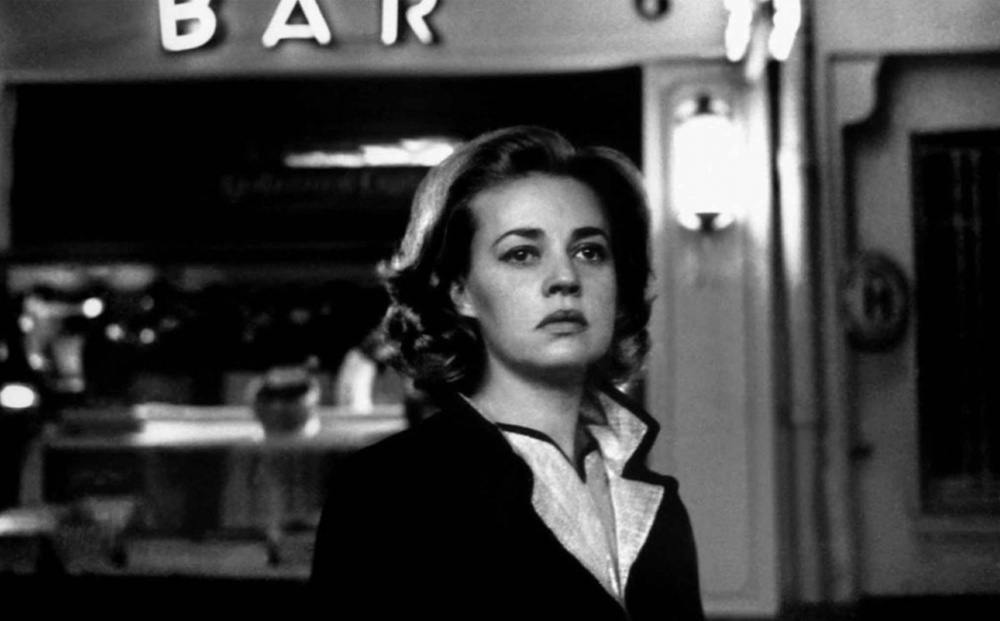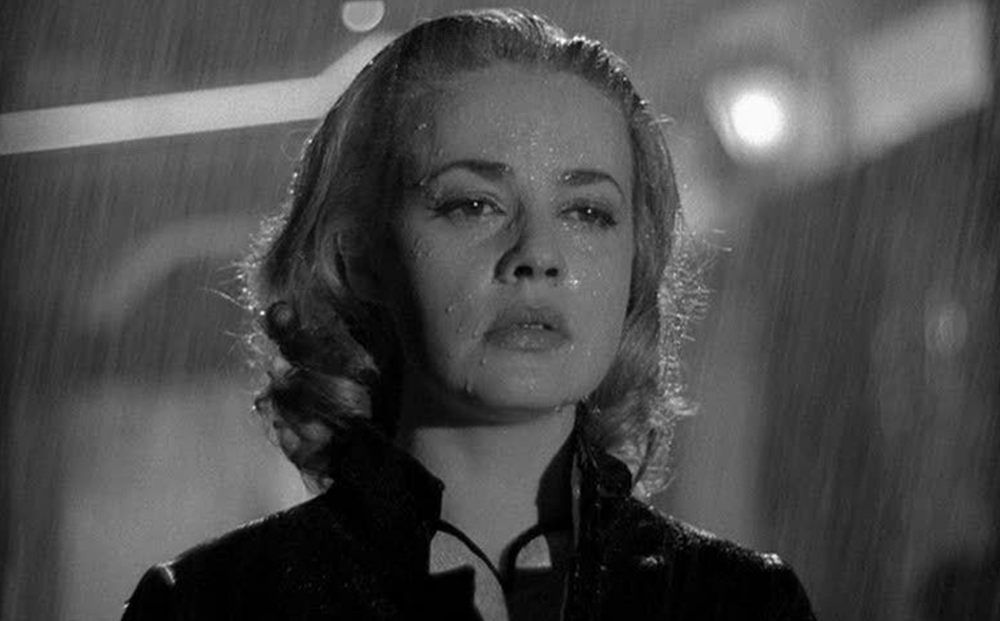ELEVATOR TO THE GALLOWS
Friday, March 3
2:30 6:30
Saturday, March 4
12:30 8:30
Sunday, March 5
8:40
Monday, March 6
2:30 8:45
Tuesday, March 7
1:00
Thursday, March 9
12:15
Saturday, March 18
6:00
Thursday, March 23
6:00
Friday, March 24
3:10
Saturday, March 25
8:00
Thursday, March 30
8:00
France, 1958
Directed by Louis Malle
Starring Jeanne Moreau, Maurice Ronet
Music by Miles Davis
In French with English subtitles
Approx. 91 min. DCP.
Blonde-tressed Jeanne Moreau and ex-paratrooper lover Maurice Ronet scheme to murder her husband by faking a suicide, but a forgotten rope, a leather-jacketed young punk car thief (Georges Poujouly, the boy of Clément’s FORBIDDEN GAMES), and a malfunctioning ascenseur conspire to complicate their plans, and then flics Lino Ventura and Charles Denner turn up the heat. For 24-year-old director Malle, his first feature only a year after co-directing (with Jacques Cousteau) the Palme d’Or-winning documentary THE SILENT WORLD; for Moreau, already dominant on stage (Maggie the Cat in the Paris production of Cat on a Hot Tin Roof), her screen-star-making role after nine years and twenty films; for DP Henri Decaë, a breakthrough in near-total avoidance of artificial light during Moreau’s night-time walk down the Champs-Elysées; for Miles Davis, a brooding, legendary jazz score, recorded in a single all-night session. Winner, Prix Louis Delluc.
Reviews
“SPLENDID. STYLISH SCREEN POETRY. Unforgettably shot by Henri Decaë... The cherry on top is the smoky, melancholic score by jazz titan Miles Davis and crew, recorded in a single session just two years before he would drop Kind of Blue. Newly restored, the film's alchemic blend of Bressonian rigor, Hitchcockian suspense, and overall proto–Nouvelle Vague cool more than compensates for its straightforward plotting… Though hardly as humanistic or naturalistic as Malle’s later work, it’s undeniably crackling entertainment that’ll have you reaching for a pack of Gauloises.”
– Aaron Hillis, The Village Voice
“Jeanne Moreau, as the boss’s wife, is as luminous as ever in black and white. Laced with the self-consciousness of the then-budding French New Wave, with a discursive plot, offhand references to French colonialism and a stylish Miles Davis score.”
– Ben Kenigsberg, The New York Times
“PROTO-NOUVELLE VAGUE STYLE…ELECTRIFYING JAZZ SCORE.”
– J. Hoberman, The New York Review of Books
“Offered crucial elements [of the French New Wave]…[Cinematographer] Henri Decaë lends the streets and buildings of Paris and its suburbs a hard, gray cinematic life. Malle includes extended scenes of [Jeanne Moreau] essentially doing nothing—wandering the streets of Paris at night and contemplating her troubles—and he had the inspiration to notice that Moreau doing almost nothing is an absorbing spectacle in itself…Elevator to the Gallows isn’t a New Wave film, but it is significant for its proto-New-Wavishness, its efforts toward originality and modernity.”
– Richard Brody, The New Yorker
“While the sad trumpet that travels alongside its main characters is genuinely one of the best scores of all time, it’s just one of the many virtues of this masterpiece. The film starts contemplative and almost Bressonian, as a man kills his boss using precise movements and careful planning, then it turns into a Hitchcock-style scenario when the assassin gets trapped in an elevator… but the film becomes its own thing, picking up stray plot strands and taking an aimless tone that’s only enhanced by the music and the parallel editing that makes the viewer something akin to a god, watching events without a fixed point of view, wallowing in the sadness and apparent foolishness and clumsiness of the characters. Especially moving are the scenes in which the wife of the killed man wanders the streets, looking for the man who can’t get out of the elevator, her lover, the one she planned the crime with. Her bloodshot eyes and mute demeanor give a powerful romantic thrust you’d think wouldn’t be present in a film springing from such a cruel and cold inciting event.”
– Jaime Grijalba, Brooklyn Magazine
“MOREAU’S PERFORMANCE IS GREAT!"
– Time Out
“A TERRIFIC THRILLER!”
– The New York Times
“SNAZZY, ATMOSPHERIC NOIR!”
– Time Out New York
“DELECTABLE! NAIL-BITING TENSION!”
– The Village Voice
“Abandons the formality of traditional crime films, the almost ritualistic obedience to formula, and shows crazy stuff happening to people who seem to be making up their lives as they go along.”
– Roger Ebert
“At the time, beautiful actresses were normally photographed in full light… The half-light playing on Moreau’s face as she walked became something of a cinematographic scandale—a shift away from conventional craftsmanship and toward expressive imperfections… A dazzlingly passionate close-up of Moreau at the very beginning of the movie suggests the depths of her longing. This is a movie built around a missed connection, and Moreau’s nocturnal wanderings are made unbearably poignant by an exquisite Miles Davis jazz score that became famous in its own right… The street scenes, the bizarre, anomalous adventures that Moreau has on her nighttime quest, the anarchic kids who just pick up and go—all this looks forward to the New Wave.”
– David Denby, The New Yorker


